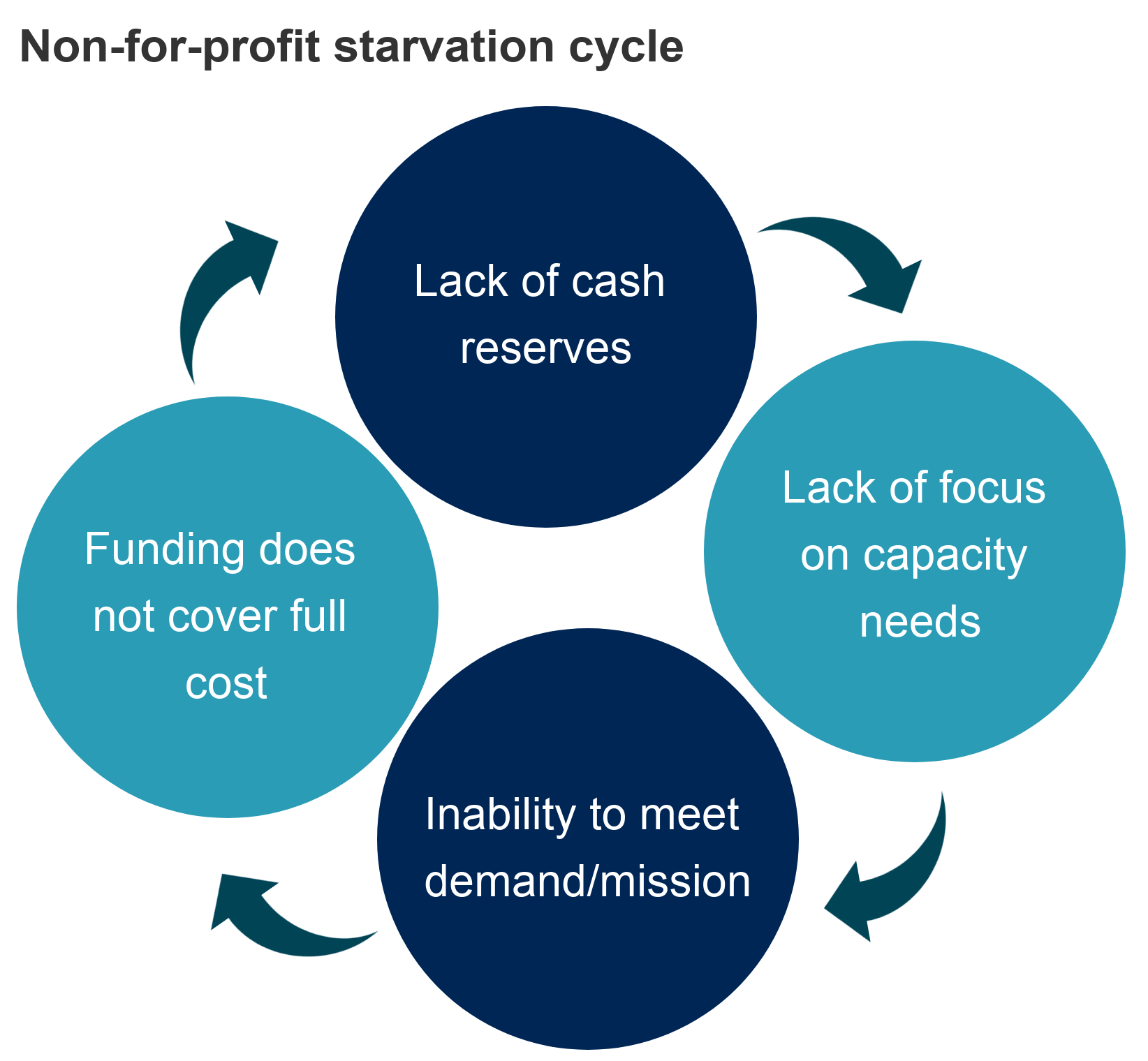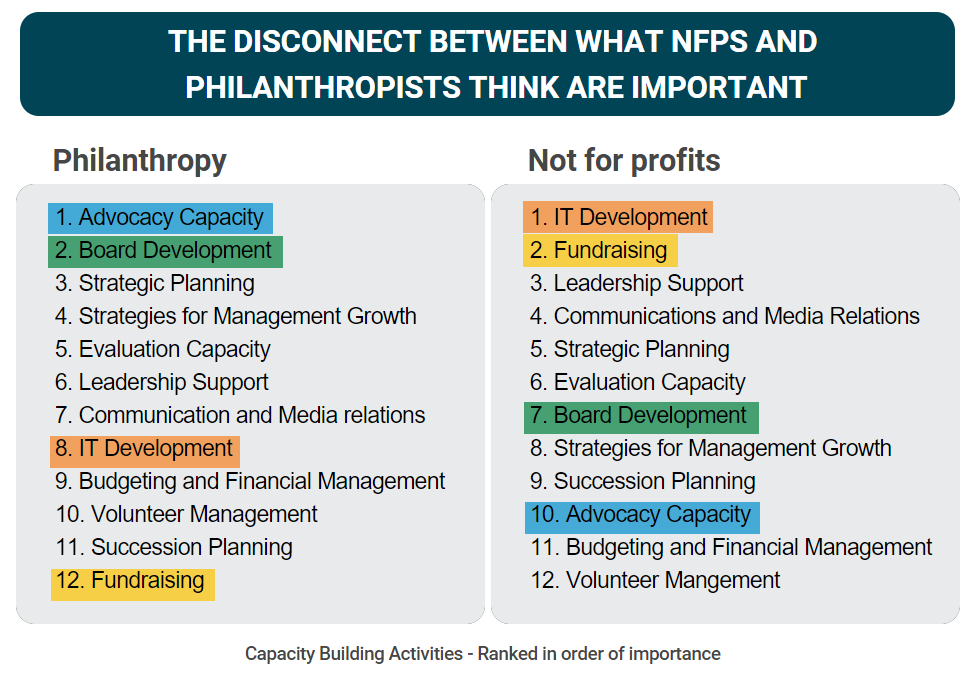
Some not-for-profits excel in supporting others but may lack the capacity or time to support themselves. In this article, we discuss the need to support organisational capacity building so organisations can continue to grow, further their reach and support the communities they serve.
What does it mean to ‘build organisational capacity’?
Building capacity means strengthening the internal structures that support a not-for-profit (NFP) in its mission and goals. It refers to the upkeep and maintenance required to keep an organisation running smoothly and successfully, so it doesn’t fall into the starvation cycle below.
 Source: Hewlett Foundation, for illustrative purposes only
Source: Hewlett Foundation, for illustrative purposes only
Caitriona Fay, General Manager of Community and Social Investment, Perpetual Private asserts: “It’s important that NFPs put long-term infrastructure in place to support their organisation from within.”
“This may mean providing supplemental skills training to staff; it may mean undertaking volunteer recruitment; it could be about reviewing their data analytics capabilities or investing in technology upgrades to aging computers or software; anything that supports the long-term strategy, aim and purpose of an organisation,” she says.
What’s the benefit?
There’s a reason why organisations need to be strong from within in order to function with strength and purpose in their goal to serve others.
“It’s a simple concept that applies to everything in life – you must look after yourself before you can look after others,” says Caitriona.
“When NFPs have a strong core, they can adequately navigate the challenges and hurdles that come from serving and supporting others in their time of need. If the organisation is weak from the inside, it will fall short and face ongoing issues in carrying out its mission to help others. It will not grow; it will not flourish – and it will struggle to succeed,” she adds.
Geoff Armstrong, Executive Director, Global Development Group attests to the benefits of capacity funding: “We’ve experienced firsthand how organisational funding is multiplied through building organisational capacity. The ability to direct designated funds to activities that significantly benefit and improve the ability of staff, partners, project managers and other stakeholders has been invaluable.”
What’s the role of philanthropists?
Over the past decade, there has been a shift from project-based funding with more philanthropic dollars going towards building organisational capacity.
Over the past decade, Perpetual has seen more of its clients’ philanthropic dollars going towards building organisational capacity.1
“Many of the philanthropists we work with understand that when they support NFP capacity they are investing in that organisation’s ability to deliver services, support and outcomes more effectively,” says Caitriona
“We need to build a culture in philanthropy where investment in capacity is seen as vital to ensuring the success of an organisation’s mission. If we care about the work of these organisations, then we have to help them invest in their infrastructure and their people.”
Julie McDonald, CEO, The Funding Network urges philanthropists to: “Invest in our greatest asset, our people and our capacity. We live and breathe our business every day – we know it inside out but to fund it through philanthropy, sometimes we find ourselves shifting or tailoring our focus to attract dollars. With operational capacity funding, we can scale our mission, stay on strategy and deliver better outcomes for our beneficiaries.”
Which capacity building activities are most important?
A study by the Asia Pacific Social Impact Centre at Melbourne Business School, “Philanthropy: Towards a better practice model” suggests that there is a disconnect in the priorities between NFPs and philanthropists when it comes to capacity funding.
The chart below shows philanthropists put ‘Advocacy Capacity’ and ‘Board Development’ as the top priorities, but for NFPs these were both far down their list.
Interestingly, IT development was at the top of the NFPs’ list, but for philanthropists this did not rank highly; and while fundraising was the second most important activity for NFPs, it was the least important for philanthropists.
“For NFPs, the daily realities of operating in a digital environment, coupled with growing resourcing costs, are top of mind. Unfortunately, both fundraising and IT infrastructure are hard things to get philanthropists excited about,” says Caitriona.
“The bottom line is that NFPs need to build capacity so they can deliver programs, create real impact and strengthen communities. As such, philanthropists need to consider how they can contribute to funding these key core requirements when the performance gains can be clearly demonstrated by the applying NFP,” she asserts.
 Source: York, J; Gillies, L; Minkiewicz, J, Philanthropy: Toward a Better Practice Model, 2018.
Source: York, J; Gillies, L; Minkiewicz, J, Philanthropy: Toward a Better Practice Model, 2018.
While the motivation for NFPs may be different, the intent, the drive and the necessity to run a successful and sustainable operation is no different to profit-making organisations. Both must succeed and be sustainable in order to function and grow, and yet, both must function and grow in order to succeed.
That’s why, organisational capacity is arguably the ‘spine and backbone’ of a strong NFP. Without this capacity, organisations face the challenges of limited program growth, limited resources, and often, staff experiencing burn-out by wearing too many hats.
Philanthropists can help support capacity building and fund a NFPs greatest need, whatever that may be. At Perpetual we are committed to encouraging philanthropy that supports non-profit organisations who demonstrate a strong focus on leadership, capability, strategy and outcomes in their sectors.
